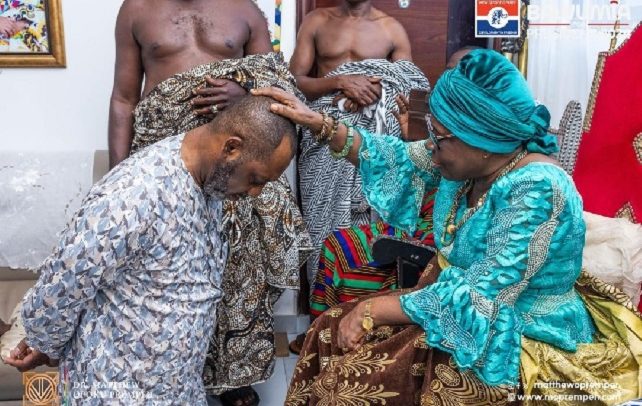In a heartfelt gesture of support and spiritual camaraderie, Okuapehemaa Nana Afua Nketiaa Obuo II of the Eastern Region extended her blessings to Dr. Matthew Opoku Prempeh and the campaign team of the New Patriotic Party (NPP) during a recent courtesy visit by the NPP Vice-Presidential Candidate.
Nana Afua Nketiaa invoked divine protection and guidance for the NPP campaign, fervently praying for the fulfillment of their aspirations.
Expressing her fond memories and close ties with Apagyafie, Dr. Prempeh’s ancestral home, Nana Afua Nketiaa underscored the deep-rooted connection she shares with the candidate, referring to him as a symbol of peace and unity akin to his esteemed forebear, Nana Sir Agyeman Prempeh. She lauded Dr. Prempeh’s character and expressed optimism that his endeavors would be met with success, offering heartfelt supplications for the realization of his aspirations.
Dr. Prempeh, in turn, reflected on the cultural diversity and heritage that epitomize Ghana, emphasizing the collective strength derived from unity and harmonious coexistence among the nation’s multifaceted ethnic communities.

The NPP’s running mate highlighted the pivotal role played by inclusivity and mutual respect in fostering national progress and cohesion.
Notably, these chieftaincy visits form part of a broader initiative by the Bawumia campaign, led by Dr. Opoku Prempeh, to deepen alliances with traditional authorities and forge collaborative partnerships between the political sphere and indigenous governance structures.
This strategic engagement underscores the party’s commitment to nurturing harmonious relationships with traditional leaders, laying the groundwork for a symbiotic relationship between politics and tradition.
As the campaign season unfolds, the endorsement and blessings bestowed by Okuapehemaa Nana Afua Nketiaa serve as a testament to the cross-cultural solidarity and shared aspirations for a peaceful, prosperous future espoused by both political and traditional stakeholders.
By Vincent Kubi


